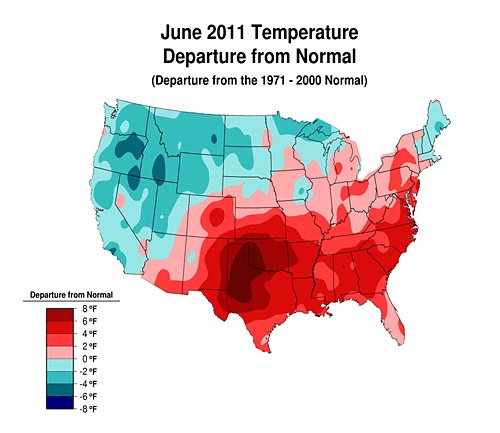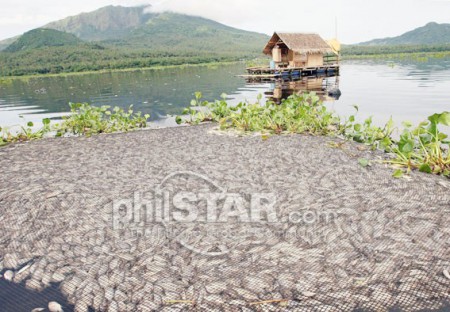- Money for AnGR conservation up for grabs.
- 8th International Food Data Conference: Biodiversity and Sustainable Diets is taking place September 14-17, 2011 at NBI Conference Centre, Norwich, UK.
- So how are we doing with that MDG1?
- More on CABI’s Plantwise. I just hope most of it will be free. They have a blog, natch.
- CIMMYT drought-tolerant maize varieties featured in blog post. I’ll alert the media. No, wait. Seems like only 60% of farmers in Kenya are willing to pay for these varieties anyway.
- No extension workers? No problem.
- A tasty dish of Ugandan grasshoppers. Always a good subject for a subtly xenophobic CNN phtoto feature.
- Cows not so bad after all?
I got your temperature anomaly right here
Luigi pointed out that my latching onto that animation of the heat wave sweeping across America “only tells you that it’s hot. Not that it’s any hotter than in ought to be”. And, as so often, he’s right. He was good enough to link to items that demonstrated that both May and June were indeed hotter than they ought to be. In the interests of making things as easy as possible, I’m going to share a picture of not the temperature but the temperature anomaly. And boy, has it been hotter than it ought to have been.

8 degrees F is almost 4.5 degrees C.
Watch the heat wave roast the US
Dept of 1 picture = 1000 words
Via Michael J. Roberts, who got it from David Lobell.
Climate change: thanks for all the dead fish
One of the little-appreciated aspects of climate change is that greater variability brings with it more frequent extremes, and if a system is already stressed it doesn’t take much to tip it over the edge. In many places, aquaculture is such a system. The photo 1 is from November 2010, but a glance at the news shows that massive fishkills are a common feature, and not just in The Philippines.
What seems to happen is a series of “unlucky” breaks. The fish are already densely stocked and overfed, and in the morning oxygen levels in the water can be dangerously low because the plants don’t produce oxygen in the dark. Most days, that’s alright, because the algae and plants in the water start to photosynthesise and put out oxygen. A cloudy morning, however, can reduce photosynthesis, and if the day is also hot oxygen levels fall even further as dissolved oxygen escapes. Worse, in hotter water the metabolism of the fish revs up, so they need more oxygen. Throw in a rainstorm, especially if soils around the fish farms are bare, and you get an influx of turbid water that further blocks photosynthesis, dropping oxygen lower still. Tonnes of fish suffocate. And lakes may take years to recover.
Authorities recommend “premature harvest” but that is clearly a Band-aid. The sustainable solution is to make the system more resilient, by decreasing stocking levels and feeding, and trying to ensure that rainwater inflows do not carry too much sediment into the water. Fish farmers cannot control the weather; can they adapt to extremes that can certainly control their business?
Nibbles: Gaur, AnGR, Wild Plants blog, Potato genebank, Research, Forests, Climate change
- Cattle do the wild thing in Vietnam.
- West African Ruminant Livestock: The Movie.
- An interesting new botanical blog on me.
- Who says working in a genebank is unrewarding? Technician is honoured with award, and that is not an oca she’s fondling?
- Back40 dissects the trouble with agriculture; it isn’t dignified. Well, it is, but …
- Forests are really, really good for economies.
- Andy Jarvis pulls it all together: looking forward to a climatically less diverse world.
